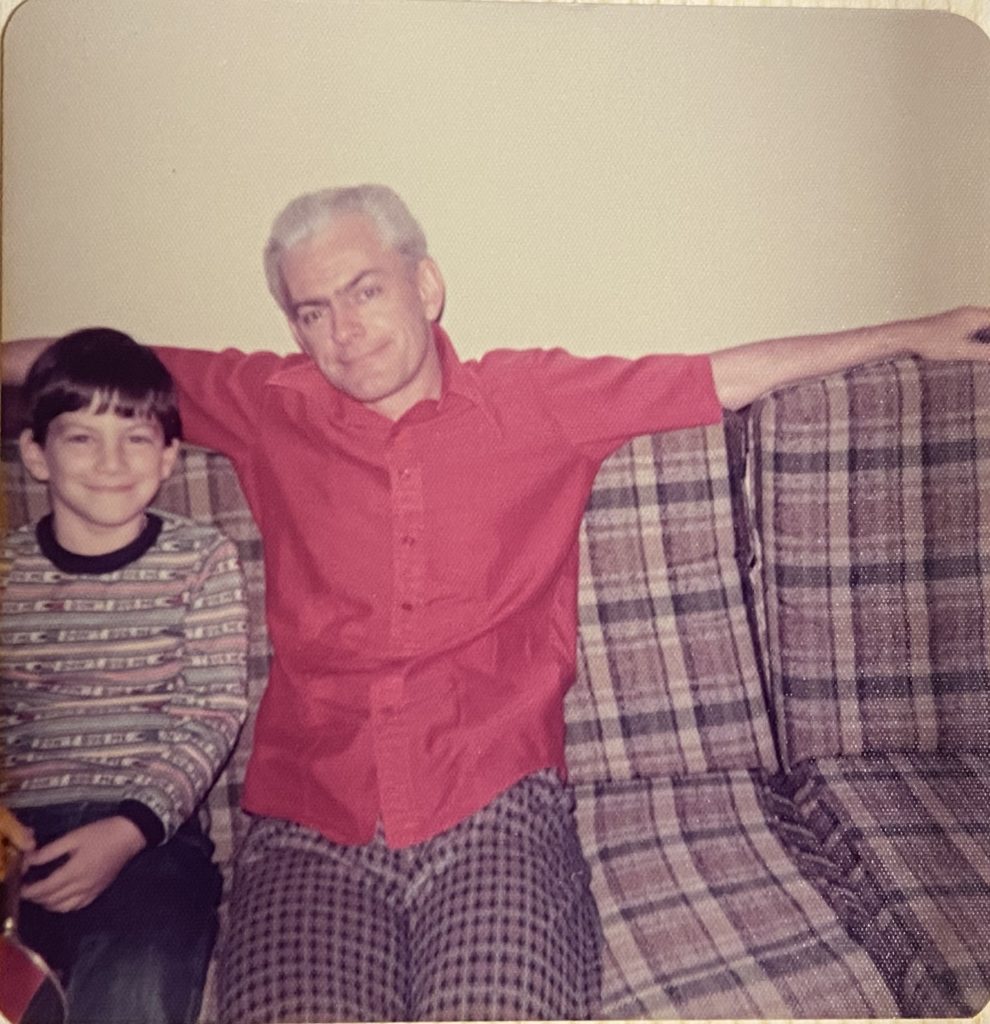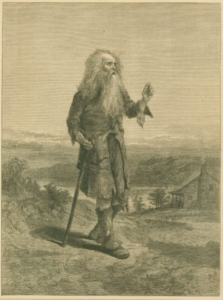I asked my wife Michael to share her earliest memory of meeting my Mom. She remembered the first Kelly family gathering she ever attended. Likely, there were 25 or more of us, celebrating a birthday or holiday or both in the house on Maple Drive. Mike comes from a smaller family, and was amazed at the pure chaos and cacophony of an Irish-American gathering. Being a conscientious person, and a great party host herself, she was aware of all the work that went into such an event, as well as everything that can go wrong. Nevertheless, she saw my mother sitting at the center of it all, chatting, smiling, and laughing. Mike approached Mom and asked how she could handle all this hubbub and hullabaloo, inquiring, “Aren’t you stressed!?!”
Mom laughed her wonderful laugh and smiled her great smile, and assured Mike. “No! I just LOVE it!”
That perfectly encapsulated Joan Roberta Kelly’s life. Mom thrived on interaction and was rarely alone. Going from a family of eight to forming a family of seven, she was always, from the Quinns to the Kellys, surrounded by others and working and living for them. In direct violation of the laws of thermodynamics, while Joan Kelly drew energy from others, she somehow delivered far more energy back. Mom was perpetually in motion for a very long time: as a mother and wife, as an independent businesswoman, as a supporter of Dad’s political career, as his chief caretaker in his last years, and as a great friend to many.
Having been so full of vitality, vigor, and goodwill, it seems impossible for Mom to be gone. She was always full of life. She was so filled with life, with Dad’s help, she created five more lives, who in turn turned out 10 more. And yet, even toward the end of her life, she still had more life to give: to Dad, JoAnn, Nancy, Loretta, Eileen, me, and all who met her.
She lost her own mother at an early age, but could still share dozens of stories about her, how she supported her family, and her wicked sense of humor. However briefly she knew her mother, Mom clearly learned from the best, and retained her compassion, consideration, and wit from Grandma Quinn as she cared for the family in the wake of her death.
Less bleakly, she enjoyed talking about her Chicago childhood and the old days. A few years back, I started giving Mom notebooks, asking her to fill them up with memories. She filled several, recollecting growing up with her mother and father and sisters and brothers in Englewood… describing six to a room in the Burns Building, before the family moved to a house… running clothes through a wringer, and stretching curtains on a stretcher to dry… digging for clinkers amongst the spent coal in the basement furnace… and the multicolor pageantry of the May Crowning at Visitation Church, when Mom crowned the statue of Mary. Mom lived a life that doesn’t exist anymore, when being Irish-American and Catholic was more of an ethnic identity than it is today.
Mom was a perfect blend of both old and modern ways. While Mom appreciated and honored the past, she wasn’t stuck there. I don’t think Mom would have described herself as a feminist, but she was one. She loved caring for us, but she also loved to work.
If I recall correctly, when she told Dad, way back in the 50s, that she planned to find a job, he responded as many men did back then. She didn’t need to work since he was the man and held down the job while she took care of the house and kids. I imagine Mom told him, in so many words, too bad. She wanted to work. Being a sensible fellow, when the extra cash arrived, Dad realized practicality beat the sin of pride.
Among other jobs, Mom opened her own hair salon in our home. My earliest memories are accompanied by an assortment of odors from the little shop in the mud room: hairspray… the hair dryer’s heating coils… bleach… and the acrid bite of permanent solution. Unpleasant for most, those scents will always mean home, and Mom, to me. They also coincided with the joy she clearly felt amongst her clients, who were her friends as well. As I played with my blocks or robots or what have you I heard my mother laughing and chatting with her “ladies.” It reassured me all was well.
Dad’s life was storied. When I delivered his eulogy last December I recounted his multiple accomplishments in political office. But for everything he accomplished, he always cited Mom’s support and influence. In John Milton’s nineteenth sonnet, “When I consider how my light is spent,” Milton wrote his most famous line, “They also serve who only stand and wait.” But Mom was no mere politician’s wife, standing behind the great man and gazing at him admiringly. She did not merely stand. She did not merely wait. Honestly, while Dad was a great speaker and organizer with a incredibly sharp mind, I always wondered how such a reserved and laconic individual made a career in politics. I was too young to remember most of those days, but doubtless Mom was the people person. One wonders what kind of political career she might have had herself. Nevertheless, they were perfect partners, in politics, love, and life.
A crabby neighbor or two aside, I never knew anyone who didn’t like Mom. Small wonder. She had a bright inner light that issued a pleasing warmth. She had another too-rare quality as well: she cared. As a writer and artist I have had a collection of fellow weirdos as friends. Tattooed folks with funny-colored hair, unusual clothing, and different ideas. A few stopped by the house to hang out or break bread. Be assured, Mom and Dad were quite conservative. But Dad was slightly more so, and sometimes looked askance at those who were insufficiently buttoned-down.
Conversely, Mom welcomed everyone. Friends who were lucky enough to have met her were astounded upon re-meeting her many years later, and touched by her ability to remember their names and faces and little things about their lives. Mom didn’t need to bluff or blarney her way through conversations. She knew, because she cared. I’d like to embarrass my sister in law Marnie for a moment by quoting a note she sent when Mom passed: “Joan had such a comforting, strong, and reassuring presence, and a knowing and kind smile that made you feel like you were welcome and loved.” Too true.
*****
The word matriarch might sound unpleasant. It suggests a powerful woman—dominating, white-haired, bitter, and controlling. Most likely dowdily dressed in black and wearing a prim lace collar while running and ruining her children’s lives. In short, the farthest thing from Joan Roberta Kelly (née Quinn), who was, in every sense, the matriarch of the Kelly family. And while we were Kellys we were also Quinns. In some ways, mostly Quinns. Dad was the only child of separated parents. Mom, as mentioned, came from a sizable brood of first- generation Irish-Americans, overseen by two formidable immigrants. The Quinn influence persisted and thrived, in no small part due to Mom. Always the linchpin, always the anchor, always the mainstay.
Before I begin to sound like I’m pitching mom for canonization, I should mention that all that warmth and cuddliness was accompanied by a sense of humor that ranged from the delightful to the dark. That was the Quinn influence too. She wanted a house filled with love but knew it wouldn’t be worth it if there wasn’t humor as well. I’m sure we’ll hear plenty of funny stories about Mom today, but I’ll share just one of my favorite Mom quotes here: “You can say I’m cute, but don’t ever call me sweet.” Who would dare?
*****
While researching this eulogy, I found an entry in Mom’s journal where she recalled her own mother passing away. One passage stood out: “We had a lot of tears. Mom is gone, moms don’t die,” she wrote. Would that it were true. But as I hope I’ve made clear, Mom was always too alive to ever die. This may be her last family event, but she will live on in those she blessed with herself.
Mom’s faith was very important to her, and she was well known for praying for those she loved. Sadly, we’ve lost her direct line to St. Anthony of Padua, patron saint of lost things. Please be advised to keep better track of your keys, wallets, and other easily misplaced items.
She had a special devotion to St. Jude the Apostle as well. As the story goes, unlike the other apostles, early Christians were less likely to ask Jude for his intercession because his name and Judas Iscariot’s were too similar. As a result, Jude took up the slack left by the others, becoming the patron saint of desperate cases and hopeless causes. Mom often prayed for St. Jude’s intercession, saying a novena to the saint whenever someone she loved faced difficulties or troubled times. I think it’s important to note that praying to Jude showed Mom’s abiding optimism and desire to help. In recent times, St. Jude has been retitled the patron saint of hope and the impossible. I don’t think Mom ever truly believed in lost causes. She believed in people. Especially her family, which includes everyone here and whoever crossed her path. It’s fitting then to end on a prayer. I can’t recite the entire nine-day novena of St. Jude right now, of course, but I came across another prayer that seems perfectly apt: the Prayer to St. Jude for Hope.
God the Father, give me hope. Help me to know that your hope is alive in me as I offer kindness, forgiveness, and tenderness to others.
I seek the calm that comes from trusting in your hope and your healing presence.
I trust that your servant St. Jude walks with me in all the blessings and challenges of my life, and intercedes on behalf of my petitions.
St. Jude, fill my heart with hope.
Amen




 Today’s blog addresses the piece of writing I worked on today. A well-overdue review of a book about Chicago’s Vivian Maier. Vivian, if you don’t know about her, worked as a nanny for most of her life and semi-secretly made a vocation of photography. Through the middle of the 20th century, Vivian snapped pictures of people on the street, self-portraits, urbanity and urban decay, and, as a strange sidebar, newspapers and documents, page by page. Vivian seemed uninterested in earning a living as a photographer. Good as she was, photography seemed more of an obsession than a means of self-expression. Afflicted with hoarding syndrome that grew worse with age, Vivian took tens of thousands of pictures, printed some, but mostly sacked away thousands of rolls of undeveloped film. When she died, few folks knew she’d been a serious photographer.
Today’s blog addresses the piece of writing I worked on today. A well-overdue review of a book about Chicago’s Vivian Maier. Vivian, if you don’t know about her, worked as a nanny for most of her life and semi-secretly made a vocation of photography. Through the middle of the 20th century, Vivian snapped pictures of people on the street, self-portraits, urbanity and urban decay, and, as a strange sidebar, newspapers and documents, page by page. Vivian seemed uninterested in earning a living as a photographer. Good as she was, photography seemed more of an obsession than a means of self-expression. Afflicted with hoarding syndrome that grew worse with age, Vivian took tens of thousands of pictures, printed some, but mostly sacked away thousands of rolls of undeveloped film. When she died, few folks knew she’d been a serious photographer.